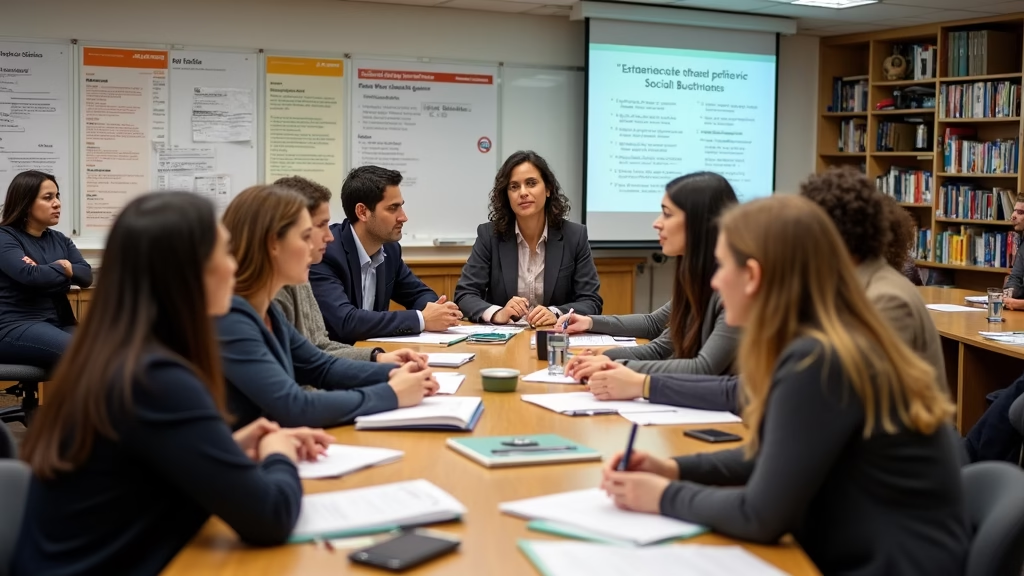Rethinking Business Education: Innovations to Succeed in Society
Why Business Schools Are Failing Society
Business schools are at a crossroads, and their trajectory has raised questions that extend far beyond classroom walls. As we delve into the challenges facing these institutions, we find that the traditional paradigms are proving inadequate in addressing the complexity of today’s world. The backdrop is painted with stories of societal and economic crises—each one a clarion call highlighting how the traditional educational model often misses the mark. Critics universally contend that business schools are failing society, and their critiques are not without merit.
The Crisis of Relevance
To understand why business schools are failing society, we must first assess the culture cultivated within these educational institutions. A pervasive focus on short-term profitability often eclipses essential discussions surrounding ethics, sustainability, and social responsibility. Graduates emerge armed with business acumen but woefully unprepared for the moral quandaries they may face in the corporate world. This fixation on maximizing shareholder value can lead to detrimental consequences—evident in crises like the financial meltdown of 2008, which showcased the stark disconnect between extravagant profits and the devastating fallout of those profit-driven choices.
Perhaps the most profound question we must grapple with is how many future leaders have navigated their academic journeys without ever confronting the concept of failure in a substantive way. Many schools too often treat failures merely as cautionary tales, creating an environment that discourages risk and reinforces a false sense of invincibility. In this era, where the mantra of “failing fast” has become a hallmark of innovation, ignoring this aspect potentially renders graduates ill-equipped for the real-world complexities they’re bound to face.
Learning from the Past
The key to cultivating resilient leaders lies in adopting a mindset that values learning from past mistakes. This encompasses not only renowned failures from the tech industry but also lessons from businesses that once thrived only to collapse under the weight of their mistakes. For instance, the falls of giants like Enron and Lehman Brothers serve as monumental teaching points that can illuminate pathways toward ethical decision-making—yet these stories are rarely integrated into the curriculum. By not fully dissecting these narratives, business schools inadvertently perpetuate a culture of silence around failure.
Moreover, the landscape of executive education has shifted dramatically in recent years. With consulting companies and training firms stepping in to offer alternative pathways, the growing competition raises an urgent inquiry: Are business schools adapting quickly enough to remain relevant? Many of these non-traditional educational providers boast agility and practical application in ways that traditional institutions struggle to replicate. This evolving educational ecosystem underscored the reality that the adversities of modern business demand innovative approaches that current curricula largely lack.
Ignoring Systemic Inequalities
In addition to addressing profitability and failure, there is a critical lens through which we must examine the curriculum: systemic inequalities. Many programs gloss over the harsh realities faced by marginalized communities and precarious workers who bear the brunt of market failures. This detachment from societal struggles creates a chasm between the theoretical knowledge imparted within classroom walls and the lived experiences of individuals in the real world.
As we consider the broader implications of these failures, one must wonder: How can business schools better equip emerging leaders to navigate ethical dilemmas and make decisions that prioritize long-term sustainability over short-term gains? This significant gap in the educational approach is not merely an academic oversight; it has profound ramifications, underscoring the urgent need for a recalibrated focus on ethics and social responsibility.
Innovative Approaches to Education
Looking toward the future, the path forward is clear. There are numerous avenues that could lead to meaningful reform. Business programs must embrace case studies that place ethics at the forefront, emphasizing sustainability and social justice. The example of the Rodale Institute—a recognized leader committed to innovative practices in regenerative agriculture—can serve as a beacon, demonstrating the transformative power of embedded ethical frameworks in business thinking.
The societal implications of business education are profound. The potential for impact lies not only in preparing graduates for success but in cultivating leaders who can address intricate societal challenges head-on. The integration of failure analysis, systemic equity discussions, and immersive ethical awareness could reshape the very foundation of business schooling.
This journey toward relevance is not merely an academic exercise; it is a call to action for educators and innovators alike. As we critique the existing frameworks, we must remain steadfast in our exploration of solutions that align with the pressing demands of our society.
Reimagining Business Education
To truly pivot from traditional models that are evidently failing society, business schools must rethink their approach entirely. This includes a significant departure from outdated pedagogies that emphasize rote learning and theoretical constructs. Instead, a more dynamic and interconnected educational framework must emerge—one that embraces interdisciplinary learning and active collaboration. Schools should function as conduits that facilitate partnerships with industries, community organizations, and even innovators within the agricultural realm, such as the ones highlighted in recent discussions about sustainable practices.
Collaborative Learning Environments
Imagine business schools where students do not just learn theories in isolation but engage in real-world projects alongside seasoned professionals and community leaders. This exposure could manifest through workshops, internships, and co-creation scenarios that foster a culture of empathy and social consciousness. Lessons from alternative educational setups indicate that participants gain profound insights when they interact with diverse perspectives, integrating sustainability and ethics into their core learning fabric. Through these collaborative environments, students can experience firsthand the implications of their decisions, solidifying the message that business strategies need to encompass more than financial returns.
Moreover, instilling a culture of inquiry around systemic inequalities shifts the lens through which students view their role as leaders. A curriculum fortified with content that encompasses global challenges encourages graduates to imagine themselves as agents of change, committed to weaving social impact into their professional endeavors. This could potentially reshape how business leaders approach decision-making processes, prioritizing long-term societal well-being alongside corporate profitability.
The Role of Technology
As technology continues to transform every aspect of our lives, it is imperative for business schools to leverage these advancements in their curricula. Digital literacy and data-driven decision making are no longer optional; they are essential skills that emerging leaders must master. Schools should place a strong emphasis on integrating modern technologies and analytical tools in their programs, allowing students to comprehend and harness data in ways that can stimulate both profitability and ethical governance.
Additionally, utilizing virtual platforms for collaborative learning can cultivate a rich, diverse student body that extends beyond geographical limitations. Online connections enable the exchange of ideas and cultural perspectives, fostering a deeper understanding of global challenges. This dynamic interchange is crucial in developing leaders who can navigate complexities across different markets and societal frameworks.
Creating Future-Oriented Leaders
Ultimately, the goal is not just to produce graduates equipped with business knowledge, but to forge transformative leaders who are prepared to confront global challenges head-on. Educational visions that prioritize innovation, ethics, and social responsibility can produce a new generation of thinkers who regard success, not just as profitability, but as contributing positively to society. This shift, however, will require invigorated commitment from educators, industry leaders, and students alike to collectively redefine what it means to succeed in business.
If these principles are embraced, we can anticipate a renaissance in business education that aligns not merely with the whims of capital but with the unwavering demands of a just and sustainable future.
In this quest for reformation, let us draw inspiration from the examples laid out before us—the innovative approaches available in other sectors may serve as a guide. Without a doubt, the potential for greater societal impact lies within our collective reach.
For continued discussion and updates on these pressing issues, consider immersing yourself in more information on such topics through platforms like the Telegram channel for “Завжди свіжі новини“.
Read more about how business schools are evolving and the necessity of embracing new approaches to meet societal demands.
latest video
news via inbox
Subscribe to the latest news in the world of politics and technology







